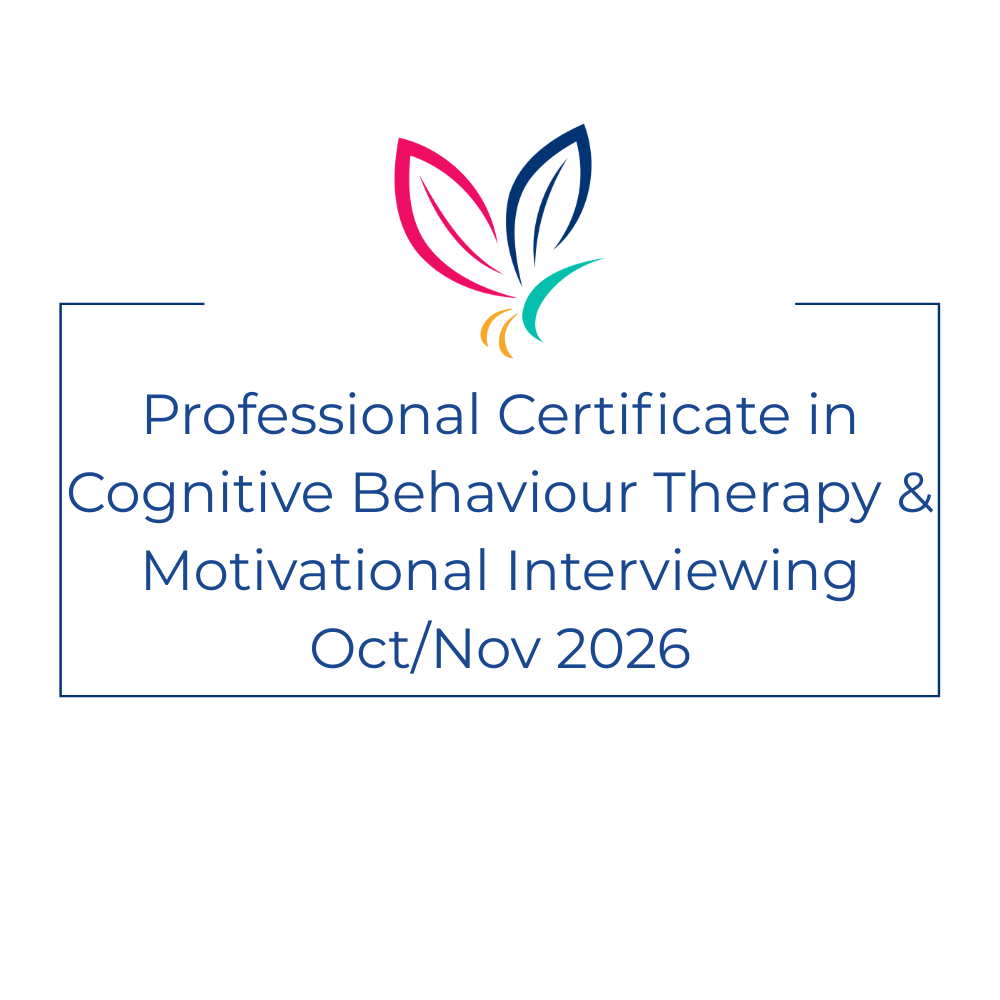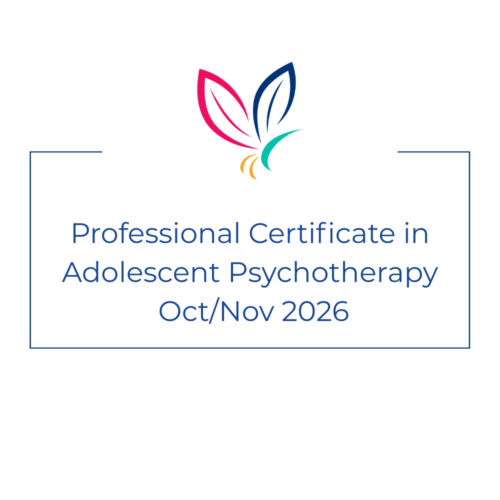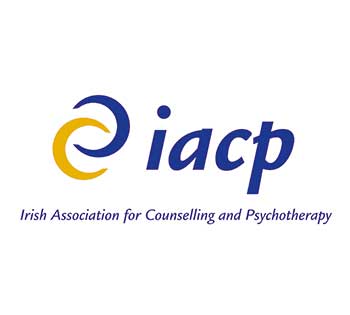Description
Professional Certificate in Motivational Interviewing (MI) & Cognitive Behaviour Therapy (CBT)
This course introduces participants to the principles and practice of Motivational Interviewing (MI) and Cognitive Behaviour Therapy (CBT), with a focus on how these two evidence-based approaches can be combined to support meaningful and lasting change.
MI provides a collaborative, person-centred way of engaging with clients, helping them explore and resolve ambivalence about change. Through learning and practising MI, you will develop skills in reflective listening, evoking change talk, and strengthening a client’s own motivation and commitment.
Building on MI, the course then moves into CBT. CBT offers a structured, skills-based framework for helping clients identify unhelpful thinking patterns and behaviours, and to develop healthier alternatives. By starting with MI and moving into CBT, participants will see how MI techniques can enhance engagement, increase adherence, and lay the groundwork for more effective CBT interventions.
Together, MI and CBT create a powerful, practical approach that not only helps clients understand their difficulties, but also supports them in taking active steps towards change.
Course Content
Motivational Interviewing (MI):
-
Historical and philosophical underpinnings of MI
-
Spirit and principles of MI (partnership, acceptance, compassion, evocation)
-
Core MI processes: engaging, focusing, evoking, planning
-
Recognising and eliciting change talk
-
Working with ambivalence and resistance
-
Developing skills in reflective listening and strategic questioning
-
Integrating MI into brief and longer-term work
-
Using MI to prepare clients for structured interventions (e.g. CBT)
Cognitive Behaviour Therapy (CBT):
-
Core principles of CBT: the cognitive model, behavioural techniques, and collaborative empiricism
-
Developing CBT case formulations and models for client work
-
Assessment in CBT
-
Introducing the CBT model to clients in an accessible way
-
Session structure in CBT: agenda setting, homework, and review
-
Building a therapeutic alliance and working through resistance
-
Key CBT techniques: guided discovery, Socratic questioning, cognitive restructuring, behavioural activation, exposure and response prevention, relapse prevention
-
Applying CBT to a variety of mental health concerns
-
Integrating mindfulness with CBT
-
Evaluating outcomes and ensuring evidence-based practice
-
Integrating CBT within your existing theoretical framework
Learning Outcomes
By the end of this course, participants will be able to:
-
Apply the spirit and principles of Motivational Interviewing (MI):
Demonstrate the ability to use reflective listening, affirmations, open questions, and summaries to establish rapport and foster a collaborative therapeutic relationship. Recognise ambivalence as a natural part of the change process and respond in a way that encourages engagement rather than resistance.
-
Elicit and strengthen motivation for change:
Identify and evoke change talk, reduce sustain talk, and help clients explore and articulate their own reasons for change. Develop skills to support clients in moving from early engagement through to goal setting and planning, while ensuring the process remains client-centred.
-
Integrate MI with CBT to enhance engagement:
Understand how MI can be used to prepare clients for more structured CBT interventions, increasing readiness, motivation, and adherence. Develop strategies to use MI as a bridge into CBT, reducing resistance and strengthening collaboration.
-
Formulate cases using CBT models:
Construct clear CBT formulations for clients presenting with a range of mental health concerns. Link thoughts, feelings, behaviours, and physical sensations into a coherent framework that guides treatment planning and interventions.
-
Communicate CBT models effectively to clients:
Learn to explain CBT concepts and techniques in an accessible, transparent, and collaborative way. Support clients in understanding how their difficulties are maintained and how change can occur through targeted interventions.
-
Apply core CBT skills and techniques:
Practise and refine skills in guided discovery, Socratic questioning, cognitive restructuring, behavioural activation, exposure strategies, behavioural experiments, mindfulness-based techniques, and relapse prevention. Adapt these tools flexibly to meet the diverse needs of clients.
-
Structure CBT sessions for effectiveness:
Develop the ability to conduct sessions that follow a clear and collaborative structure, reviewing between-session tasks, addressing current difficulties, and setting new goals. Learn how to use and effectively set up in between sessions tasks to extend learning and support behaviour change outside of therapy.
-
Evaluate progress and outcomes:
Gain confidence in using structured measures and client feedback tools to assess progress, guide decision-making, and adapt interventions where needed. Use evaluation both as a way to track change and to strengthen the collaborative process with clients.
-
Integrate MI and CBT into existing frameworks:
Understand how MI and CBT can be combined with and adapted to other therapeutic orientations (such as psychodynamic, humanistic, or integrative). Learn how to incorporate these approaches into your own style of practice in a way that remains coherent, flexible, and client-centred.
Dates and Cost
- Dates: 16 Oct, 23 Oct, 6 Nov, 13 Nov, 20 Nov 2026
- Price: €750
- Payment plan: 3 instalments
- Deposit: €150 (due at booking)
- 2 further payments of €300 each
Cancellation & Transfer Policy
I understand that circumstances can change, and I aim to be as fair and transparent as possible.
- Up to 14 days before the course start date: Paid fees will be refunded in full, less a €50 administration fee. Alternatively, if the course is running again, you may transfer your booking to a later date at no extra cost.
- Less than 14 days before the course start date: A cancellation fee of 50% of the course fee will apply. Alternatively, if the course is running again, you may transfer your booking to a later date, subject to availability.
- Less than 48 hours before the course start date / non-attendance: Unfortunately, no refund can be issued. Alternatively, if the course is running again, you may transfer your booking to a later date, subject to availability.
All cancellations or transfer requests must be made in writing by email.
If a course is cancelled by the organiser, participants will receive a full refund of fees paid or may choose to transfer to another date where available.
FAQ
How is the course delivered?
The training is delivered live online via Zoom, with interactive presentations, discussions, role-plays, case work, and practical exercises.
Are the sessions recorded?
No, the course will not be recorded. The sessions are highly interactive and often involve participants sharing experiences from their own work or from their private lives. To maintain confidentiality and create a safe and open space for discussion, we keep the training live only.
Can I record the sessions for my own use?
No, participants are not permitted to record the sessions. This is to respect the confidentiality of all participants and to encourage everyone to contribute freely.
What happens if I miss a session?
Detailed lecture notes , readings and other materials are provided. If anything feels unclear, you are welcome to check in with me directly.
Do I need to prepare anything before the course starts?
No preparation is required. Some participants find it helpful to reflect on examples from their own work with adolescents, but this is optional.
What is the time commitment?
The course runs over four full training days, with additional time between sessions to review materials and practise skills.
What materials are provided?
You will receive comprehensive lecture notes, handouts, worksheets, and tools that you can use straight away in practice.
Will I receive CPD hours and a certificate?
Yes. Successful completion awards the Professional Certificate Cognitive Behaviour Therapy, approved for 35 CPD hours.
Is there an assessment?
There is no formal written assessment. Certification is based on full participation in the live training.
What if I have questions during the course?
You’re encouraged to ask questions at any point during the live sessions, and you can also follow up with Susi afterwards if you need clarification on anything.
Course Trainer
Susi Lodola is an experienced psychotherapist and clinical supervisor, known for her engaging and practical approach to training and development. In her private practice, she helps clients build emotional resilience and navigate mental health challenges through evidence-based therapeutic approaches. As a clinical supervisor, Susi supports fellow therapists in deepening their skills and confidence, fostering professional growth and enhancing therapeutic outcomes.
Alongside her clinical work, Susi is an experienced third level lecturer, and her teaching blends academic theory with real-world insights, ensuring students gain not just knowledge but the confidence to apply it effectively in practice.
Susi’s ability to simplify complex concepts and create a supportive learning environment consistently receives positive feedback from students, many of whom credit her for advancing their professional development.
Beyond academia, Susi delivers corporate workshops on mental health and wellbeing, equipping organisations with tools to foster healthier, more resilient workplaces. She has also provided specialist training for mental health practitioners, including those working within NEPS (National Educational Psychological Service).
A strong advocate for continuous learning, Susi deepened her expertise by attending a specialised CBT workshop at the Beck Institute in Philadelphia, focusing on CBT.
Qualifications:
- MSc CBT & Motivational Interviewing
- BA (hons) Psychology
- BA (hons) Linguistics
- BA Psychotherapy
- Prof. Cert. Child & Adolescent Therapy
- Prof. Cert. Mindfulness
- Suicide Intervention Training
- Diploma in Clinical Supervision






